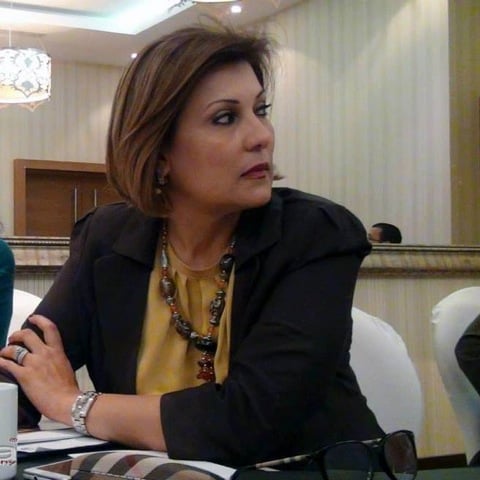By Libya Herald staff.

Tripoli, 26 June 2014;
Tributes to women’s rights lawyer Salwa Bugaighis, brutally murdered in Benghazi yesterday, have been pouring . . .[restrict]in.
UN Secretary General Ban Ki-moon has strongly condemned the assassination, calling Bugaighis a “courageous and respected human rights defender”.
The head of the UN’s body to promote equality, UN Women, Phumzile Mlambo-Ngcuka, said she was “personally outraged and deeply saddened by this brutal murder”. Bugaighis had been “a brave leader who advocated for the human rights of her people”.
Italian Foreign Minister Federica Mogherini, congratulating Libyans on yesterday’s House of Representative elections expressed shock at the murder which she said was “very painful” for her personally. It had, she said, “tainted the election”.
The Candian Foreign Ministry said that Canada “strongly condemns the assassination in Benghazi of Libyan lawyer Salwa Bugaighis, a prominent human rights activist who helped organise the first protests against Qaddafi”. It was all the more abominable on the day Libyans were electing the new national legislature.
Both the British and US ambassadors to Libya have paid personal tributes to Bugaighis on social media. British Ambassador Michael Aron said he was “devastated about horrific murder of Salwa Bugaighis”, calling her a leading light of the 17 February Revolution and a human rights’ champion.
US Ambassador Deborah Jones has called Bugaighis a Libyan heroine and patriot – “a beacon” for human rights and democracy.
Various national and international organisations have expressed shock and horror at the killing, which many see as one of the biggest blows since the revolution to Libya’s hopes of freedom, prosperity and stability.
“After years of standing up to Muammar Qaddafi’s tyranny and defending Islamist activists, some of whom were now trying to impose their views on her and other women, she continued to stand up for herself and other Libyan women,” said Human Rights Watch.With her death, it added, “the original idealism of the 2011 uprising that overthrew Qaddafi’s tyranny has received another crushing blow, and many Libyan women have lost a role model.”
Bugaighis’ murder “robs Libyan civil society of one its most courageous and esteemed figures,” said Amnesty International. The Libyan authorities had to do “everything possible” to ensure that her death “is fully, independently and impartially investigated and that anyone responsible is held to account”.
Lawyers for Justice in Libya (LFJL) said that her murder “marks the loss of a great voice in the fight for equality”.
“Salwa was an inspiration to us all, as lawyers, activists and women”, said Elham Saudi, LFJL’s director. “We value her support of LFJL’s work and will remember in our work going forward to make sure that her memory and tireless fight for human rights and reconciliation are honoured in whatever way possible. We are a lesser nation without her. Allah yarhemha.”
Saudi added: “Salwa Bugaighis demonstrated in her last hours, when she was pictured voting, that she believed in a democratic Libyan state. The state must show its equal commitment to her by ensuring that those responsible for these violent attacks are held accountable for their crimes. As long as those who commit such abhorrent crimes enjoy impunity for their actions, the ongoing violence in Libya will continue.”
For Gender Concerns International, it “did not seem a coincidence that her voice was silenced on a historic election day in Libya”. However, her voice would not be silenced, it believed. “This tragedy will strengthen the commitment of women’s and human rights activists in Libya.”
Libyan social media has been full of shock, horror and anger at the killing – probably more so than the assassination, exactly one year ago today, of fellow Benghazi lawyer and political activist, Abdulsalam Musmari.
It produced a wave of nation-wide protests against the Muslim Brotherhood, who were blamed at the time.
Protests over Bugaighis’ assassination are expected tomorrow in Benghazi and elsewhere after Friday prayers.
But perhaps for many ordinary Libyans, the shock is not just that a human rights activist was murdered. “For us, as Libyans,” commented one Tripoli resident, ” for men to go into a private house and murder a women is beyond understanding”. For him and for many others, those who killed Bugaighis were monsters and traitors to their own culture. [/restrict]








